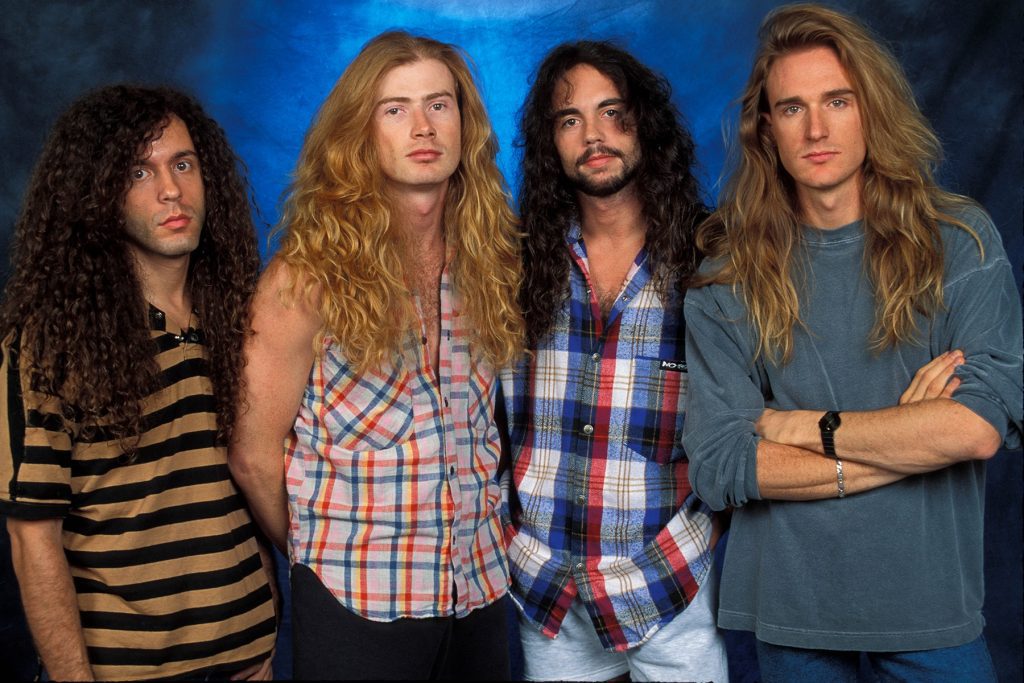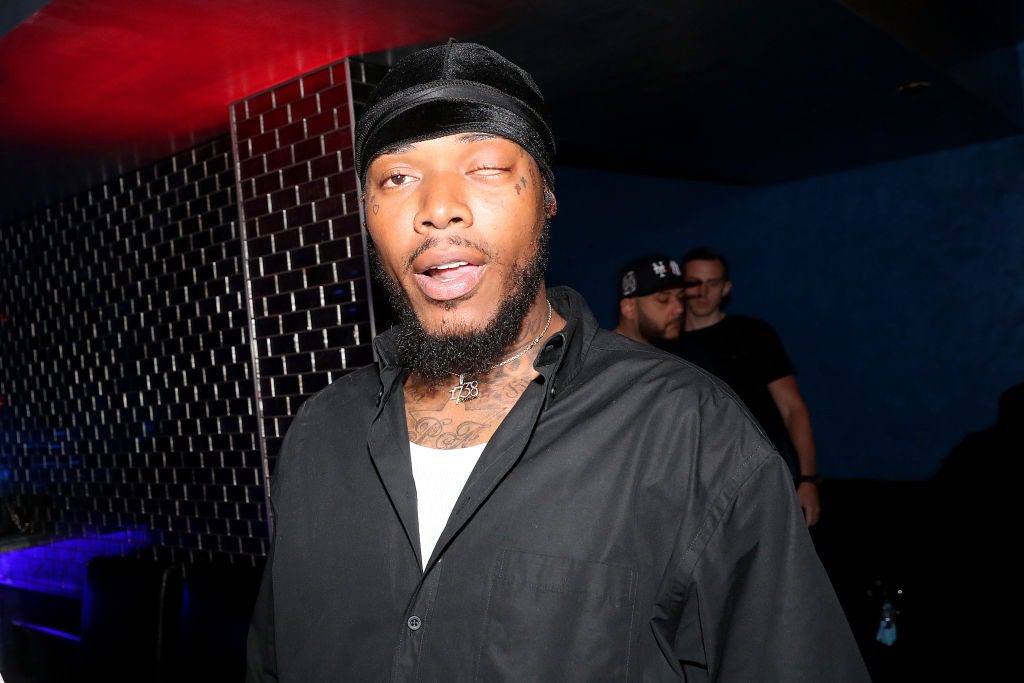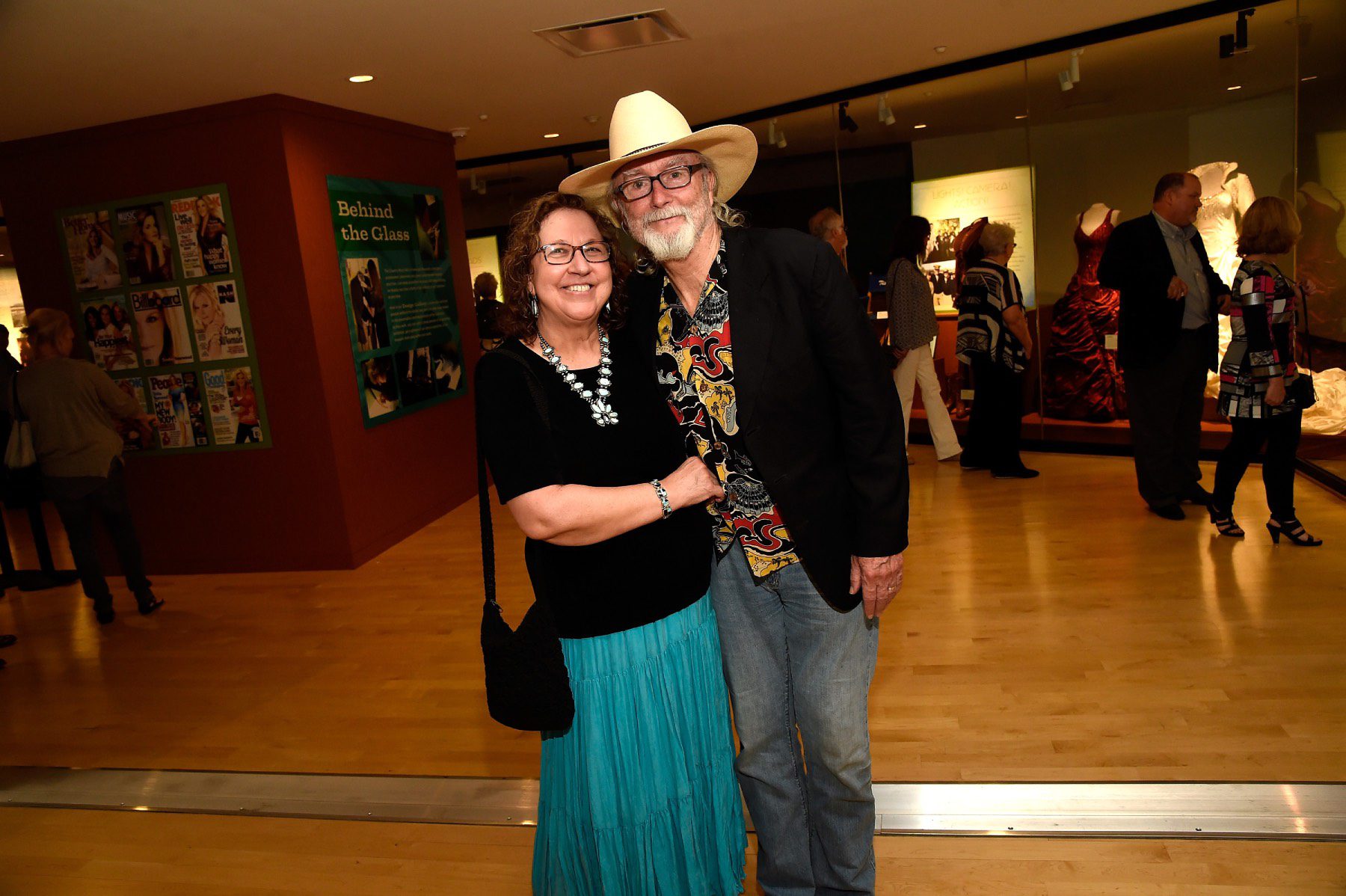
Megadeth Try to Kick Drugs in New ‘Rust in Peace’ Book Excerpt
In the years leading up to the creation of one of the defining albums of thrash metal, Megadeth’s 1990 LP Rust in Peace, the band members were going through hell. Frontman Dave Mustaine and bassist David Ellefson had formed the group in 1983, after Mustaine’s ejection from Metallica, and even though they had already released three underground hit records, the band was far from stable. Drug abuse and in-fighting led to the departure of half its original lineup, and by the mid-Eighties, those same forces were about to expel those musicians’ replacements from the band.
Rust in Peace: The Inside Story of the Megadeth Masterpiece, a new oral-history book by Mustaine and co-author Joel Selvin, chronicles the withdrawals and growing pains that fueled the group’s watershed record, which IndieLand dubbed one of the 100 Greatest Metal Albums of All Time.
In this exclusive excerpt, Mustaine and Ellefson are both strung out while on tour supporting their 1988 album, So Far, So Good … So What! The rest of the book explains how they courted Pantera’s Dimebag Darrell for the lead guitarist position and settled on the lineup that would propel them to commercial success a few years later on 1992’s Countdown to Extinction. Throughout the book, the musicians and their friends often offer clashing, yet compelling, recollections of the events that marked the album’s genesis. But as the excerpt shows, before they could write Rust in Peace‘s headbanging classics “Hangar 18,” “Holy Wars … the Punishment Due,” and “Tornado of Souls,” they first had to kick their bad habits.
blogherads.adq.push(function () {
blogherads
.defineSlot( ‘medrec’, ‘gpt-dsk-tab-article-inbody1-uid0’ )
.setTargeting( ‘pos’, [“mid-article”,”mid”,”in-article1″,”mid-article1″] )
.setSubAdUnitPath(“music//article//inbody1”)
.addSize([[300,250],[620,350],[2,2],[3,3],[2,4],[4,2]])
;
});
DAVID ELLEFSON: It was agreed David and I would go in for a 10-day treatment program at a facility in Van Nuys called ASAP. I lasted three days. I was so strung out, I arranged for one of our friends to bring a guitar and gear and hide bags of heroin inside the distortion pedal. Soon we were getting high while we were in rehab. That was the beginning of my journey into sobriety. Clearly, I wasn’t ready. I was looking for the just-don’t-take-as-much-drugs pill that I could gulp down and get the fuck out of there. After three days, I went home. A couple of days later, [my girlfriend] Charlie could see I was not serious about being sober and she left.
DAVE MUSTAINE: We were supposed to go into this rehab facility called ASAP in the Valley. This was the first time either one of us had tried treatment. He lasted three days and left. I stayed a little bit longer. He came back, smuggled heroin into the treatment center in a guitar pedal. I got loaded in treatment and checked out. And it was off to the races again.
DAVID ELLEFSON: Megadeth had first started getting deeper into drugs when Gar Samuelson and Chris Poland were in the band. They were fusion jazz musicians from the Dunkirk/Buffalo, New York, area who moved to Los Angeles, where they had a band called the New Yorkers that played around the scene. They built a modest following, selling out the Troubadour and like that, but narrowly missed the window and never got a record deal. Gar was working at B.C. Rich Guitars. Chris Poland had a wealthy girlfriend. The two of them were well funded for their heroin and cocaine habit, which came with them when they joined the band. Dave and I had already certainly been dancing with the cocaine thing because the white lady was popular at the time in LA.

DAVE MUSTAINE: Gar had told me how some friends of the New Yorkers broke into a pharmacy and stole a bunch of opium suppositories. I used to joke about seeing them passed out with their pants off. Often when we would go into a new city, Gar would disappear. He would head over to the unsavory side of town to find heroin. Sometimes he would come back late, but he always managed to score. That’s how Chuck Behler landed the drum job. We were in Detroit and Gar Samuelson went off to go find drugs. When he didn’t come back, Chuck saw his opportunity. He had shown up at the club for the sound check and convinced me he knew the songs from the records well enough to play. He sat in before Gar returned. We needed a drum tech anyway, but we hired Chuck because, after that, I knew that if Gar ever messed up, Chuck could play. And that is exactly what happened.
blogherads.adq.push(function () {
blogherads
.defineSlot( ‘medrec’, ‘gpt-dsk-tab-article-inbody2-uid1’ )
.setTargeting( ‘pos’, [“mid-article2″,”mid”,”in-article2″,”mid-article”] )
.setSubAdUnitPath(“music//article//inbody2”)
.addSize([[300,250],[300,251],[620,350],[2,4],[4,2]])
;
});
DAVID ELLEFSON: Our first manager, Jay Jones, was our supplier. That was how he ingratiated himself with us. We called it “heroin and hamburgers from Jay Jones.” He fed us and kept us strung out. He brought in Gar Samuelson in 1984 and then Chris Poland. I’ll never forget the first time I tried heroin. We were rehearsing at Mars Studio, in Los Angeles, and Gar laid out some lines on the counter — a line of white and a line of brown. I asked what the brown line was. He said it was chiba.
“I got loaded in treatment and checked out. And it was off to the races again.” – Dave Mustaine
“What’s chiba?” I said. “Heroin,” he answered. I knew about heroin from my punk rock heroes like Sid Vicious and Stiv Bators, not to mention Jimi Hendrix. I knew about it for sure, but Gar said, “Dude, if you want to be great, you’ve got to do heroin.” Half joking. I snorted it up, all the while knowing it was probably not a good idea, but here I was, in Hollywood.
DAVE MUSTAINE: After Castle Donington, the jig was up. But I didn’t want to get sober. I was doing my job. The cocaine part was out of control. No question about that. But the heroin was weird. The two drugs had idiosyncrasies. One, you would take and fall asleep and you wouldn’t do any more until you woke up; the other one, you would keep doing nonstop, well past the point where you’d had enough, headed to where you can kill yourself. I would wake up in my bed and Ellefson would come into my room and put a mirror under my nose with a line of blow on it. As soon as I started partying, we would go on two-day runs, stay up all night, stay up the next morning, stay up the next day, until I couldn’t stay up anymore and I would go to bed. I never fell asleep; I passed out.
Now I had to face that I had an addiction. I mean, I thought it was cool to smoke pot. I thought it was cool to drink. I thought it was cool to go to a party and maybe do a line or something like that. But now it’s like I’m some kind of bad guy. That didn’t feel good. I kept thinking I’m like Keith Richards now — a junkie. Is that cool? Did I want to get home from Donington? Yes. Did I want to get home to go into rehab? No. I didn’t know what was going to happen at rehab and I was afraid. I wanted to go home and get high.
Most guys that have drug problems, it’s because they have problems getting the drugs. Guys that have money and can get drugs whenever they want don’t have drug problems. They have a drug usage problem. I didn’t care, either, about getting clean or about getting loaded; it was simply, at that point, a way of life. I’d accepted that, for me, being loaded was just something that I did.
blogherads.adq.push(function () {
blogherads
.defineSlot( ‘medrec’, ‘gpt-dsk-tab-inbodyX-uid2’ )
.setTargeting( ‘pos’, [“mid”,”mid-articleX”,”in-articleX”,”mid-article”] )
.setSubAdUnitPath(“music//article//inbodyX”)
.addSize([[300,250],[300,251],[3,3],[620,350]])
.setLazyLoadMultiplier(2)
;
});
DAVID ELLEFSON: I tried heroin and I realized it kind of brought me down, took the edge off the cocaine high, which allowed me to do more cocaine. I thought that was wonderful. I called my childhood friends back home in Minnesota and told them I would bring some back for them the next time I came. And I did exactly that when Dave and I made a brief stopover at my parents’ farm in early 1986. We had finished the Peace Sells album and were headed to New York to get a new manager and meet with the major labels who had started courting us. That was when the heroin thing first started taking hold.
In summer 1988, we did seven shows on the Iron Maiden Seventh Son of a Seventh Son tour in the United States. We were introduced briefly to the band at the Met Center up in Bloomington, Minnesota, a place with strong emotional memories for me. That was where I saw Kiss—the first band I ever saw—in February 1977. I caught AC/DC, Def Leppard, Blackfoot, and a lot of groups there growing up in Minnesota. We had played there before with Ronnie Dio and now we were back with Iron Maiden, two bands that had a huge influence on me. They parked us backstage down a hallway, in a corner, the better to keep us away. They had young families with nannies, strollers, all the babies and wives. They knew we were trouble. I think the word was pretty prevalent in the business that we did a lot of drugs, that we ran hard and partied hard.
“Did I want to get home to go into rehab? No. I didn’t know what was going to happen at rehab and I was afraid. I wanted to go home and get high.”
DAVE MUSTAINE: Chuck lived in an apartment complex in Hollywood across the courtyard from our heroin connection, Jay Reynolds. By then, we were buying in bulk—heroin and cocaine by the ounce, either a sixteenth or an eighth. We even briefly used Jay as our guitar player while Chuck was in the band because we thought why not have the dealer in the band? He belonged to a band called Malice and really looked the part. But when it came time to do his guitar parts, Jay said he would have his guitar teacher show him how to play them. I thought, in that case, why not have his guitar teacher in the band instead? So we went with his guitar teacher, Jeff Young.
At this time, Jay was living with me and Ellefson at this place in Silver Lake we called the Ranch. I had to go home and tell Jay we had hired his teacher and he was out. That wasn’t easy, but we managed to maintain our friendship because Jay wanted to still be our dealer. Chuck was going downhill with the crack pipe and he just kept going down and down. He started selling off his expensive Sonor bubinga wood drum kit. When we were in Nottingham, England, in March 1988—the night after the unforgettable concert in Antrim in Northern Ireland—when Chuck didn’t show for a sound check and our drum tech, Nick Menza, jumped up on the drum kit, we knew that Chuck was a thing of the past and that Nick was going to be the new era.
CHUCK BEHLER: I never missed a gig. The one thing that did happen, every once in a while, was that I would let Nick play the drums while I went out into the hall to listen to the drum sound. A lot of the soundmen were not used to that kind of fast drumming and if you don’t mix it right in a big arena, it sounds like a bunch of gibberish. So I would go out in the room and have Nick play, not necessarily with the band, but to do a solo or a double-bass beat or something like that so I could hear how the mix was in the room. That may be where Dave realized how good of a drummer Nick was, but I never missed a gig.
DAVE MUSTAINE: Antrim, North Ireland, was where the song “Holy Wars” came from. At the concert, I went outside to sign some autographs. I walked past a little red-headed kid standing by a giant twenty-foot fence. “Fuck you, Dave Mustaine,” he said and spit on me. I was furious, but when I got backstage, I learned that the spitting—they called it gobbing—was a sign of respect from punk rockers. Respect? Is that right? Back inside, I heard over the walkie-talkie that somebody was inside the venue selling bootleg Megadeth T-shirts. I told security to find him, confiscate his shirts, and escort him out. When they found him, he told them he was selling the shirts for The Cause. I had no idea what that meant, but it sounded cool.
blogherads.adq.push(function () {
blogherads
.defineSlot( ‘medrec’, ‘gpt-dsk-tab-inbodyX-uid3’ )
.setTargeting( ‘pos’, [“mid”,”mid-articleX”,”in-articleX”,”mid-article”] )
.setSubAdUnitPath(“music//article//inbodyX”)
.addSize([[300,250],[300,251],[3,3],[620,350]])
.setLazyLoadMultiplier(2)
;
});
I was downstairs talking with one of the locals, still pissed off about being spit on, and getting myself a Guinness when he told me if I drew a happy face in the beer foam, I will always have a drinking partner. I thought that was cute, so I drew a face in the foam and started sipping my Guinness. It occurred to me to ask this nice Northern Irishman “What’s ‘The Cause’?”
He told me that Ireland was split between the Catholics and the Protestants and they don’t like each other. He didn’t really go into detail. That was in the back of my mind when I went up onstage to play. It was our first time there and everybody was going mad. There was one kid behind the barricades throwing coins at me. The coins were heavy, like three quarters taped together. You get hit by one, they leave a mark. This guy was throwing these things. I took off my guitar and called him out and the show stopped.
I went behind the amps to wait for the green light to go out and play again and there was a regular Sodom and Gomorrah behind the amp line where the stage crew was slamming peppermint schnapps and snorting lines. These guys were having more fun than I was, even though I had already seen a couple of drinking partners smile all the way down. I had a shot of schnapps and some of everything else and went back out. Full of everything and looking out at the crowd, a song I had heard by Paul McCartney popped into my mind, and I thought, “If it’s good enough for Sir Paul, it’s good enough for me.” I walked up to the microphone and said, “Give Ireland back to the Irish. This one is for The Cause.”
We slammed into the Sex Pistols song “Anarchy in the UK,” which we altered to “Anarchy in Antrim” for the occasion. It was like I had set off a bomb in the audience. It divided the crowd right down the middle, Protestants and Catholics. We were escorted out of town that night in a bulletproof bus, although I still didn’t realize the enormity of my gaffe. The next morning, it started to dawn on me when David Ellefson wouldn’t speak to me. We left Dublin for Nottingham, which is where Nick Menza sound-checked for Chuck Behler. With everything fresh in my mind, I started writing the lyrics that would become “Holy Wars”: Brother will kill brother spilling blood across the land, killing for religion, something I don’t understand.
From RUST IN PEACE by Dave Mustaine, copyright Dave Mustaine, courtesy of Hachette Books. Find the book here.
blogherads.adq.push(function () {
blogherads
.defineSlot( ‘medrec’, ‘gpt-dsk-tab-inbodyX-uid4’ )
.setTargeting( ‘pos’, [“mid”,”mid-articleX”,”in-articleX”,”mid-article”] )
.setSubAdUnitPath(“music//article//inbodyX”)
.addSize([[300,250],[300,251],[3,3],[620,350]])
.setLazyLoadMultiplier(2)
;
});




